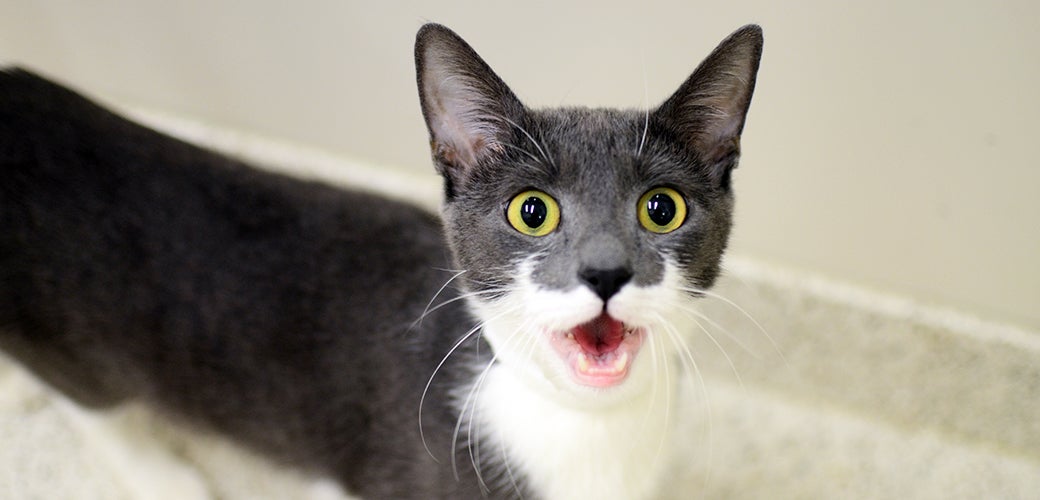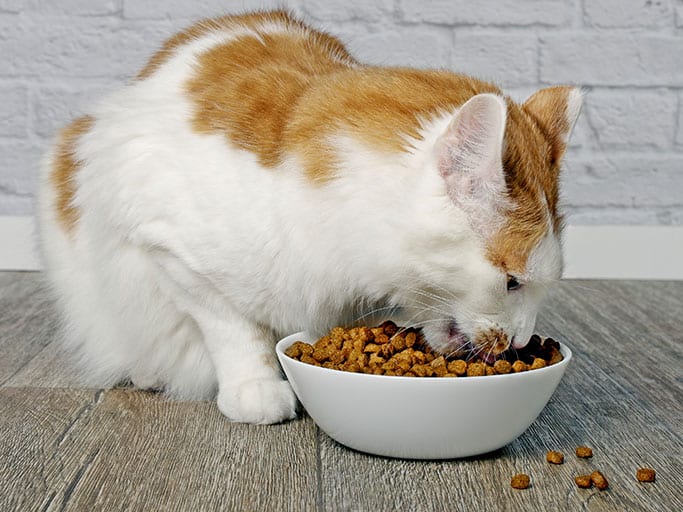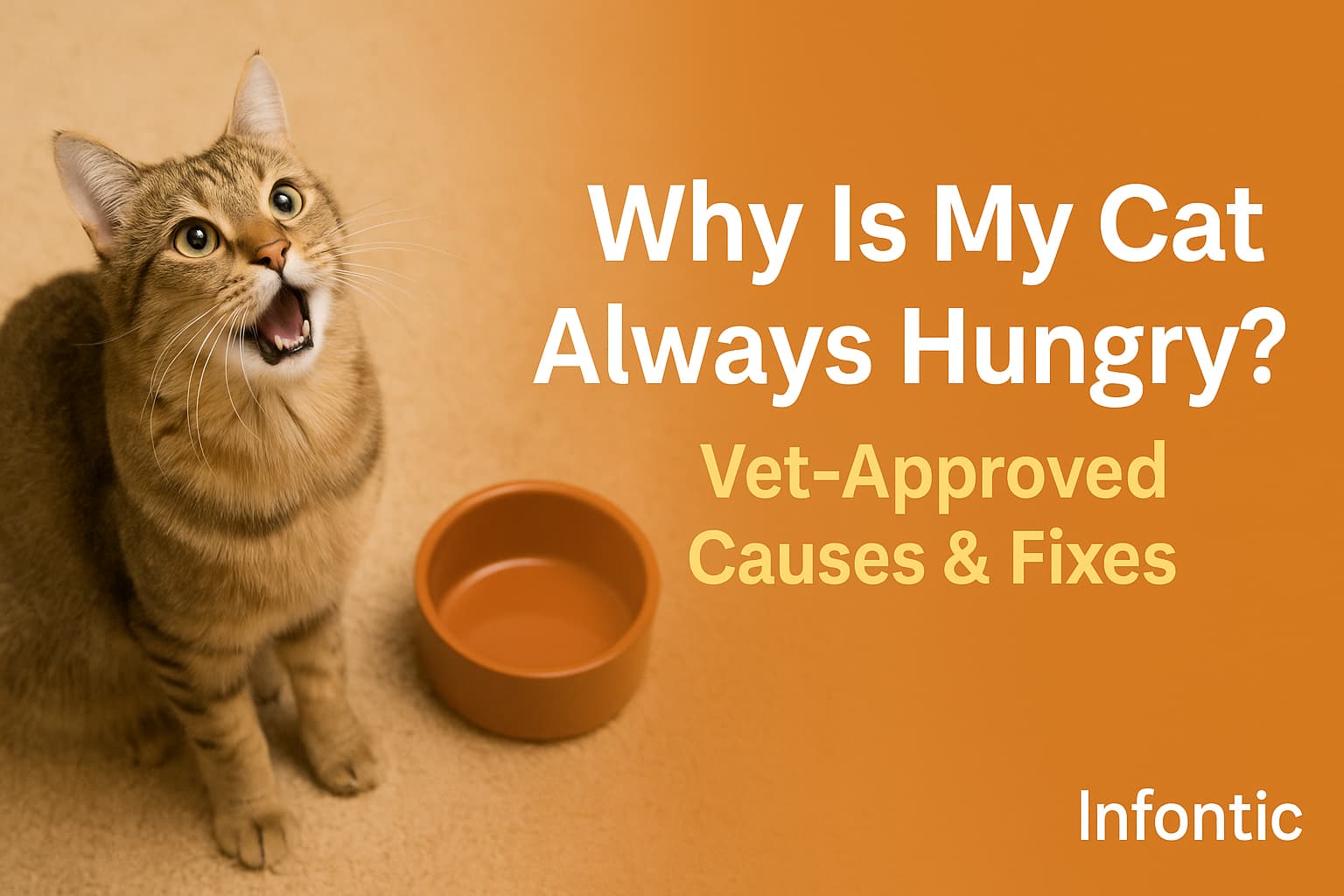Cats often meow to communicate hunger or a need for attention. If your cat is always hungry and meowing, it’s essential to understand why.
Cats are curious creatures whose behavior can signal various needs or concerns. Is your furry friend demanding more food or expressing discomfort? This constant hunger and meowing might seem puzzling. Some cats meow for food due to genuine hunger or boredom.
Others may have underlying health issues. As a cat owner, deciphering these meows is vital. Understanding your cat’s behavior can improve its health and happiness. We’ll explore common reasons for this behavior and offer tips on addressing them. Let’s ensure your cat feels satisfied and loved.
Causes Of Constant Hunger
Cats can feel hungry due to medical conditions. Diabetes in cats can cause them to eat more. “Polyphagia (increased appetite) is a hallmark symptom of feline diabetes mellitus due to the inability of glucose to enter cells for energy use.”
—Cornell University College of Veterinary Medicine. Hyperthyroidism makes them always hungry, too. “Hyperthyroidism increases a cat’s metabolic rate, often resulting in increased appetite despite weight loss.”
— American Association of Feline Practitioners. Intestinal parasites might be stealing their food. Check with a vet if your cat eats a lot but loses weight. They need the proper care to stay healthy.
Cats need the proper diet to stay full. Low-quality food might not fill them up. They need enough protein and fats in their meals. A balanced diet keeps them satisfied. Feed your cat the right amount. Overfeeding can make them gain weight. Underfeeding leaves them hungry. Follow the feeding guide on the food package.

Understanding Cat Meowing
Cats use meowing as a way to communicate. They tell us what they need. Each meow can mean something different. Some meows are short. They might mean the cat is happy. Long meows can mean they are hungry. Cats meow to greet us. They also meow when lonely.
Cats have different meows for different moods. They use meows to express feelings. Listen to the tone of the meow. That helps you understand your cat better. Cats use body language, too. Watch their tails and ears. They tell us a lot about how they feel.
Hungry cats meow often. They want food and attention. Some cats meow to get noticed. They might want to play. Others meow for petting or cuddling. Cats learn that meowing gets them what they want, which can make them meow more.
Understanding why your cat meows helps. It makes them happier. You can give them what they need. Cats are intelligent and know how to get attention. Try giving them toys or playtime. It can reduce meowing. Happy cats meow less.
Assessing Your Cat’s Diet
Cats need a balanced diet to stay healthy. “Cats are obligate carnivores and require high protein diets rich in taurine, arachidonic acid, and preformed vitamin A for optimal health.”
— Merck Veterinary Manual. They require proteins, fats, and carbohydrates. Proteins help build strong muscles. Fats give them energy. Carbs support digestion. Vitamins and minerals are also essential. They keep the cat’s body working well. Always check the food label to ensure it meets all nutritional needs.
Feeding the correct amount is crucial. Too much food can make a cat fat, and too little can cause hunger and meowing. Use a measuring cup for accuracy. Follow the guidelines on the food package. Adjust portions based on your cat’s weight and activity level. Consult a vet for advice. They can help determine the right portion size.

Addressing Health Issues
Constant hunger and meowing in cats might indicate health issues like hyperthyroidism or diabetes. “Changes in eating behavior, such as increased hunger, can indicate underlying endocrine disorders like hyperthyroidism or diabetes mellitus.”
— International Cat Care. Consulting a vet ensures proper diagnosis and treatment, effectively addressing nutritional needs. Keeping track of your cat’s eating habits helps identify changes early.
Veterinary Consultation
Pets need regular check-ups. Cats meowing often may have health problems. Veterinary consultation is essential. Vets help find the cause. They check for diseases or infections. A vet can suggest tests. Blood tests are standard. Vets look at the cat’s weight. Weight loss can mean illness. Cats need proper diets. A vet can suggest food changes. That helps control hunger.
Common Health Problems
Cats can have many health issues. Hyperthyroidism is a common problem, making cats hungry all the time. Diabetes is another issue. Cats with diabetes drink more water. Obesity affects many cats, making them hungry. Vets can help with these problems. Dental issues also cause hunger. Cats can’t eat well with bad teeth. Parasites like worms cause hunger, too. “Gastrointestinal parasites can reduce nutrient absorption, increasing hunger and weight loss in cats.”
— ASPCA Animal Poison Control Center. It’s essential to treat these issues. Vets provide medicine for parasites. Regular care keeps cats healthy.
Improving Feeding Habits
Cats feel more secure with a routine; scheduled feeding helps control hunger. Set regular meal times for your cat and offer food at the exact times daily. Your cat will learn the routine, which reduces constant meowing. Ensure meals are balanced and healthy. Provide enough food to satisfy your cat’s needs. Avoid overfeeding to prevent obesity. Stick to the schedule for the best results.
Interactive feeding tools can make meals fun. “Puzzle feeders can enhance feline welfare by encouraging natural hunting behaviors and reducing boredom-related vocalizations.”
— Journal of Feline Medicine and Surgery. Use puzzle feeders or treat balls. These tools challenge your cat and slow down eating, stopping your cat from overeating and keeping its mind active. Interactive tools are easy to find. Most pet stores have them. Make sure the tools are safe and durable. Check them regularly for damage.
Reducing Excessive Meowing
Cats meow to get attention, and training can help reduce this. Use a consistent routine. Feed your cat at the same time every day. Play with your cat often. This keeps them happy. Offer positive reinforcement. Praise your cat when it is quiet. Use treats to reward good behavior. Teach your cat to respond to commands. Simple commands like “quiet” can work. Start with short sessions. Keep them fun and engaging.
Toys are great for keeping cats busy. Offer different types of toys. Interactive toys are ideal. Puzzle toys make them think. Create a space for them to explore. Cat trees are perfect for climbing. Hide treats around the house. That makes your cat search for food. Scratching posts are essential. They help your cat stay active. Provide a cozy bed for rest. A happy cat meows less.
Monitoring Weight And Behavior
Weigh your cat often and keep a record of the weight. This helps you know if your cat is gaining or losing weight. Use a digital scale for accuracy. Cats should not gain weight too fast. Sudden weight changes can mean health issues. Talk to a vet if you notice unusual weight changes. Checking weight is essential for a healthy cat.
Watch how your cat acts. Is your cat hungrier than usual? Does it beg for food often? Meowing can be a sign of hunger. Notice if your cat is restless or anxious. Cats sometimes meow for attention, too. Check if your cat seems sad or bored. Happy cats usually meow less. Observe your cat’s actions daily. That helps you understand your cat better.
Long-term Management Strategies
Cats love consistency in their daily life. Feed your cat at the exact times. That helps them feel secure. Playtime should also be at set times. It keeps them happy and active. Provide fresh water regularly. Cats need it to stay healthy. A consistent routine helps reduce stress. Happy cats meow less for attention.
Regular visits to the vet are essential. They keep your cat healthy. Check-ups catch health issues early. That helps manage hunger and meowing. Vets can check for worms. Worms make cats hungrier. They can suggest the best diet. A good diet reduces excessive hunger. Health check-ups ensure your cat’s well-being. A healthy cat is a happy cat.
Frequently Asked Questions
Why Does My Cat Act Like She’s Starving All The Time?
Your cat may act hungry due to medical issues, an insufficient diet, or a high metabolism. Boredom or habit can also cause this behavior. Ensure the cat is fed a balanced diet and consult a vet if concerned about her health.
Why Does My Cat Keep Meowing For Food Even Though He Already Ate?
Cats meow for food due to habit, attention-seeking, or discomfort. Ensure they’re fed well and consult a vet if concerns persist.
Why Is My Cat Begging For Food All The Time?
Your cat might beg due to hunger, boredom, or habit. Ensure it has a balanced diet, and consult a vet if the behavior persists.
Why Is My Cat Still Hungry After Eating?
Your cat might still be hungry due to insufficient food, high activity levels, or underlying health issues like hyperthyroidism. Ensure balanced meals and consult a vet if needed. Consider their age, weight, and lifestyle for proper portion sizes. Monitor their behavior for signs of illness or stress.
Conclusion
Understanding your cat’s hunger and meowing is essential. Cats meow for many reasons, and hunger might be one of them. Check their diet. Ensure they’re eating enough. Sometimes, cats meow for attention or stress. Consider their environment. Are they bored or anxious?
Regular vet visits can help. Rule out health issues. A healthy, happy cat meows less. Observing changes in behavior helps. Trust your instincts. Your cat relies on you. Listening and adjusting their care can reduce excessive meowing. Embrace the bond.
It strengthens understanding.
- Cornell University College of Veterinary Medicine. “Diabetes Mellitus.” https://www.vet.cornell.edu/…/diabetes-mellitus
-
American Association of Feline Practitioners.
“Hyperthyroidism in Cats.”
Hyperthyroidism
- International Cat Care. “Hyperthyroidism.” https://icatcare.org/advice/hyperthyroidism/
- Merck Veterinary Manual. “Nutrition for Cats.” https://www.merckvetmanual.com/cat-owners/nutrition-for-cats/nutrition-for-cats
- Journal of Feline Medicine and Surgery. “Puzzle feeders improve feline welfare.” https://doi.org/10.1177/1098612X20940162
- ASPCA Animal Poison Control Center. “Common Cat Parasites.” https://www.aspca.org/pet-care/cat-care/common-cat-parasites
🩺 Reviewed by Dr. Audrey Cook, BVM&S, DACVIM-SAIM, DECVIM-CA
Professor of Small Animal Internal Medicine
Texas A&M University, College of Veterinary Medicine
Dr. Audrey Cook is a globally recognized expert in veterinary endocrinology. With certifications in both U.S. and European veterinary medicine, she specializes in feline diabetes, insulin therapies, and chronic endocrine disorders. Her work influences best practices in clinics worldwide.






